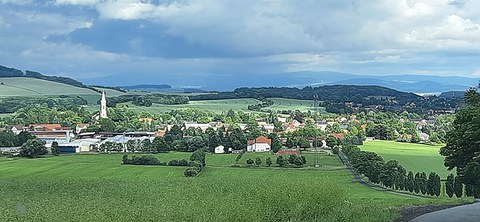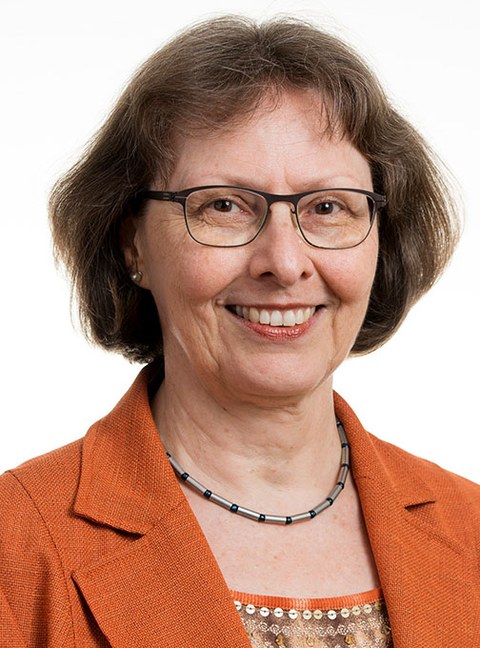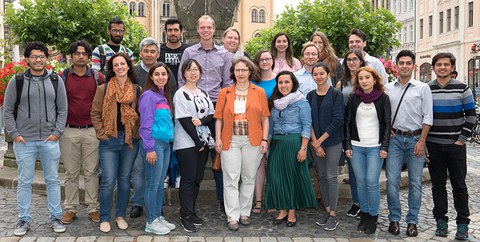Jul 10, 2023
Why and how experts for ecosystem services are trained
Dagmar Möbius
Since the 2017 winter semester, the International Institute (IHI) Zittau has been offering the English-language Master's degree program “Ecosystem Services.” Professor Irene Ring has set up the program, which is unique in Germany. Each semester, between 15 and 20 students from all over the world are coming to Zittau, and the trend is on the rise.

The Zittau Mountains were declared the 100th nature park in Germany in 2007. Students involved in a project there have provided a forest nature trail with QR codes that convey information about the ecosystem services of the forest.
What nature is doing for us
The world is facing global change. Biodiversity is endangered and the conditions of ecosystems are deteriorating. What can we do about it? Ecosystem services help to make important decisions regarding biodiversity and sustainability strategies in science, politics and society, at national, European and international levels.
Ecosystem Services

Professor Irene Ring has contributed her expertise to IPBES, the Intergovernmental Science-Policy Platform for Biodiversity and Ecosystem Services.
“The degree program combines everything I worked on in my life,” Professor Irene Ring summarizes as an introduction. The graduate geoecologist and doctor of economics has held the Chair of Ecosystem Services since 2016 and built up the international Master's program “Ecosystem Services” along with her small team. There are currently three research associates who together fill 1.5 full-time positions. In addition, there is staff for third-party funded projects.
Through the cooperation partners of TU Dresden's Faculty of Environmental Sciences, the Senckenberg Museum of Natural History in Görlitz and the Leibniz Institute for Ecological Urban and Regional Development in Dresden, students at the IHI benefit from top-class interdisciplinary expertise.
Unique degree program in Germany
Although there are similar models at other national and international universities that address biodiversity, ecosystem services and sustainability, Prof. Irene Ring is not aware of an identical degree program in Germany. Students applying for the four-semester Master's program “Ecosystem Services” must have a relevant Bachelor's degree. Some even have professional experience. “The requirements to enter the program are comparatively open,” she says. The undergraduate degree can be in biology, geography, forestry, or even economics or social sciences, as long as the latter had a subject-related concentration. “For this consecutive and research-oriented Master's program, we require prior knowledge of conservation and environmental topics. If you have never dealt with these issues in your studies, you are too far away,” is the professor's experience.
Interdisciplinarity between ecology and economy
A particular scientific level in the natural and social science subjects is crucial to her: “To give you an example, students learn empirical social research from scratch, so that even those with a science background know how to design a good questionnaire and evaluate stakeholder interviews.” In addition to interdisciplinarity between the various scientific disciplines, students also learn and practice transdisciplinary work in projects. “They will need that in their later professional lives, regardless of where they work,” Professor Irene Ring is convinced. “I want them to be able to approach stakeholders and be proficient in different areas, such as ecology and economics.” The students in the international Master's program not only come from all over the world, they also bring very different previous experience with them. “Each semester, we observe that they help each other in working groups to learn what they still need to know. The biologists assist the economists and social scientists with the ecological subjects, and the economics graduates in turn help the natural scientists with the economic and sociological content.”
The degree program starts in Zittau, the numerous elective specializations of the program in the second half of the program, such as in Environmental Social Sciences, Ecology and Collections, Biotechnology, Forest Sciences, or Spatial Development and Natural Resource Management, can be completed in Zittau, Görlitz, Dresden or Tharandt.

Students of the ESS18 course at the market square in Zittau in 2019
Potential career paths
Since the program was established, the first three years of graduates have started their professional careers. “Many of them are doing their doctorates at renowned institutions in Europe or their home countries, and some are involved in the consulting field,” reports Professor Irene Ring. A classic alumni event has not yet taken place. “The program is too young for that,” she explains. She is following some of the graduates' careers via social networks. Quite a few of the students found jobs through the three or six week mandatory internship, a semester abroad or a practice partner where they wrote their Master's thesis. A few examples: A Columbian graduate did her internship and her subsequent Master's thesis at the UNESCO Chair of Sustainable Development and Environmental Education at the Universidad del País Vasco in Spain. Now, she is a PhD student in a program on biodiversity and ecosystem management at the same university. A graduate from Ghana, who spent an ERASMUS semester at the Environmental Faculty of Jan Evangelista Purkyně University in Ústí nad Labem, is now pursuing a PhD at this Czech university. A Chinese graduate is working on green finance at an industrial bank in China, and a German graduate wrote her Master's thesis at the Leibniz Center for Agricultural Landscape Research and did so well that she was accepted as a doctoral student there. Graduates from Malaysia, Colombia, Costa Rica and India are now working on biodiversity, climate and sustainability issues at consulting agencies and foundations, or as research assistants at the German Federal Institute of Hydrology.
Contact:
TUD Dresden University of Technology
International Institute Zittau
Chair of Ecosystem Services
Prof. Irene Ring
Tel.: +49 3583 612-4167
